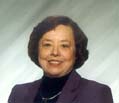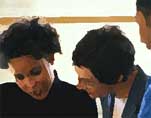Interview with Martha ShortPresidential Award for Elementary Mathematics Teaching, 1999 |
 |
After 23 years in the classroom, Martha Short is now an independent educational consultant for schools. In addition to providing professional development regularly to teachers, during a professional sabbatical, she spoke every day in a state-sponsored program, Select Teachers as Regional Resources (STARR).
How did you get started in providing professional development?
I actually started at the behest of a computer science teacher who knew I had a computer in my classroom and was using it with students. She asked me to share resources, so I did a program with demonstrations to help people who were trying to get started.
I started doing other projects for the state, and then I worked for a university doing some adjunct faculty work providing professional development for a group of teachers once a month for a couple of years. I provided them with ideas they could use in their classroom and they came back every month and shared.
I decided I liked providing professional development and started doing it on a regular basis in addition to my classroom assignments. You learn so much more, not only to share with teachers, but to use in your classroom. You really become a dynamic teacher because of it.
When you were teaching, how did you juggle your teaching responsibilities with providing professional development?
I did a lot in the summer and there were times when I used personal days. There were times when the school district realized it was in their best interest to let me go because I represented the district. Since their name was attached to the work I was doing, it made the school district look like it was on the cutting edge. I also did a lot of weekends.
What advice would you give to a teacher who wants to get involved in providing professional development?
The first thing to do is see if there is some presenting you can do within your district. You might start by giving a presentation to other teachers about a conference you’ve attended, or doing a presentation for your local math or science group or state meeting. Start with a short program that is 45 to 60 minutes. Then gradually work up by applying to do regional math or science conferences and then nationals when you feel comfortable.
Another starting point is to observe how others provide professional development. Analyze why you liked the presenter, what they did that hooked you, their presentation style, and what made it good for you. Look at the handouts they provided and think about what you like or don’t like about it. This will give you background when you start putting your own handouts together.
The best thing I can tell teachers is “just to do it.” The only way to find out if providing professional development is for you is to be adventurous enough to try it. It’s actually like doing student teaching. Tough at first. You over-prepare, lose sleep the night before, and finally, if you do it enough, you get to the point that it’s just second nature. Also, realize that at some point in your life, you’ll have a bad one. You may have someone in your group who’s really distracting, and you have to learn to cope with that just like you do in a classroom.
You also have to believe that each one of us has something to add to somebody’s professional life, and never rule out where you’ll get an idea. Always be open-minded.
When a teacher starts conducting professional development workshops, how can he or she establish a comfort level or a trust with teachers?
It’s like making a first impression. Establish right from the very start that you are one of them. Tell them you understand there are major problems and that what you plan to do for that session will have a certain set of goals. This helps people realize that this is going to be a session where there is great empathy for what they do and that you really are there to help them. And usually something humorous is kind of nice just to break the ice. A little chuckle seems to do wonders to get people relaxed.
Before giving a workshop, you should always know your audience, where the teachers are coming from. I try to find out about the goals and issues of the school districts I’m providing professional development for. You definitely can’t go into workshops blind. If you're going into a school, you need to ask questions about why the administration wants you to come, the grade level of the teachers, and their receptivity to these ideas. Did the teachers pick this topic or did administrators? Sometimes administrators have one agenda and teachers have another.
How do you help teachers take the next step and try something new that will have an effect on their classroom practice?
Some teachers are forced to come by their administration and you just make it as palatable as possible for them. Show them the research that says this method works better but they’re going to have to be willing to try it. However, having other teachers who really want to try new things is like having a marvelous student in your class. Also, if the administrators in charge will come and participate, the teachers will, too. If an administrator does everything that the teachers do, you know you've got a dynamic setting.
Another tip is that if I do a workshop with several districts, I mix them up so they sit with different schools and different groups so they get a whole different perspective. When people are with strangers, they'll try things much more readily than they will if they have two or three of their buddies.
At the end of a workshop, I always have teachers write down three new things that they’re going to try. There is something about committing it to paper that is kind of like a binding contract. Also, following up with another workshop, if possible, helps teachers follow through because they know they will be expected to share something they’ve tried.
As a provider of professional development, what sort of feedback do you like to get from your participants?
I like to ask participants what they wish I had done differently, and sometimes they'll give you a suggestion that's really meaningful. You need to be very open-minded and not take criticism personally. You also need to do your own reflection on what went well, what didn't, and why. Lots of programs or districts also require written evaluations, which can also provide you with helpful feedback.
How do you frame a discussion when you're conducting professional development with teachers?
One of the best ways is using the Socratic seminar technique. This helps me be able to lead a discussion but fade in the background. I would urge anybody who thought they were going to lead those kinds of discussions to have that training in Socratic seminar. I also try to be careful about when I step in and step out of the discussion and don’t allow put downs. Everything needs to be framed in a positive way, and I try to set up the ground rules when I start.
How do you think mathematics professional development can get “equal time” with reading?
I do a workshop in making connections between literature and mathematics. I show teachers how to use a child’s story book to teach a mathematical concept and as the spring board to a lesson. Sometimes you can teach reading, writing, mathematics, science, and even social studies all in one book and one lesson. Teachers need to learn that they can fit more into the course of a day. I think this can even be used with eighth and ninth graders, having them pull out all the data and do as much higher-order thinking as they would with a two-page lesson in a math book.
How do you think your experiences in providing professional development contribute to the advancement of mathematics reform?
First, as a presenter, I must constantly stay abreast of new mathematical practices by attending "cutting edge" presentations such as NCTM Annual Meetings, NCTM Academies, and research sessions, and reading continually in the area of mathematics. Then I must find activities that demonstrate these new practices and use them with participants. No one will use new material until they have experienced it and know how to adapt it to their classroom. This is how I feel I can make the best contribution to quality math reform. No one in this profession can ever rest on their laurels. You are only as good as your next presentation.
If you have any questions you would like to ask Martha Short about her
experiences in providing professional development, contact her at mshort@ldd.net.

